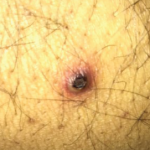NEW YORK (Reuters Health)—In most cases, rectosigmoidoscopy and colonoscopy assessments of disease activity in ulcerative colitis yield the same results, researchers report.
“In clinical practice, rectosigmoidoscopy is enough to assess endoscopic activity and endoscopic healing,” Dr. Jean-Frédéric Colombel from Icahn School of Medicine at Mount Sinai, N.Y., told Reuters Health by email.
Dr. Colombel and colleagues in Spain, Belgium and California used data from the EUCALYPTUS trial of etrolizumab to evaluate whether endoscopic assessment limited to the rectosigmoid adequately represents endoscopic activity of the more proximal colon and how potential discrepancies might affect assessment of efficacy.
“To me the most surprising is that this was never studied,” Dr. Colombel said. “We relied so far on endoscopic exam of the rectum and sigmoid both in clinical practice and clinical trials without knowing if it reflects the ‘all picture.'”
The team analyzed 239 videos that included assessment of colonic segments proximal to the rectosigmoid region for disease activity and endoscopic healing. They graded endoscopic severity using the Mayo Clinic Score endoscopic subscore (MCSe) where active disease was defined as a score >1 and endoscopic healing was defined as MCSe<=1 or MCSe=0.
Rectosigmoidoscopy and colonoscopy analyses agreed in 230 of 239 videos, yielding a strong correlation between their scores (r=0.84), the researchers report in Gastroenterology, online Oct. 22.
In nine videos, rectosigmoidoscopy found evidence of healing, whereas colonoscopy of the more proximal colon found mucosal lesions.
When healing was defined as MCSe=0, there was near perfect correlation between the endoscopies (r=0.96), with only one video showing endoscopic healing in the rectosigmoid while significant mucosal lesions remained in the proximal colon.
According to the MCSe, disease was more severe in the rectum and sigmoid than in the proximal colon in all but 4.6% of individual reads, and this assessment was confirmed when MCSe was combined with the Ulcerative Colitis Endoscopic Index of Severity (UCEIS).
“Because of its strong ability to detect active disease, rectosigmoidoscopy should be sufficient in clinical practice for evaluating previously diagnosed patients with new symptoms,” the researchers conclude. “However, in cases where rectosigmoidoscopy has detected endoscopic healing in response to induction therapy, but symptoms persist, performance of a more extensive examination with colonoscopy is justified.”
“In the clinical trial setting,” they add, “this study suggests that if endoscopic healing is defined as an MCSe=0, rectosigmoidoscopy is sufficient for efficacy analyses. However, if endoscopic healing is defined as an MCSe<=1, these preliminary data suggest that colonoscopy is better than rectosigmoidoscopy for assessing the full extent of endoscopic healing for efficacy analyses of experimental therapies.”
